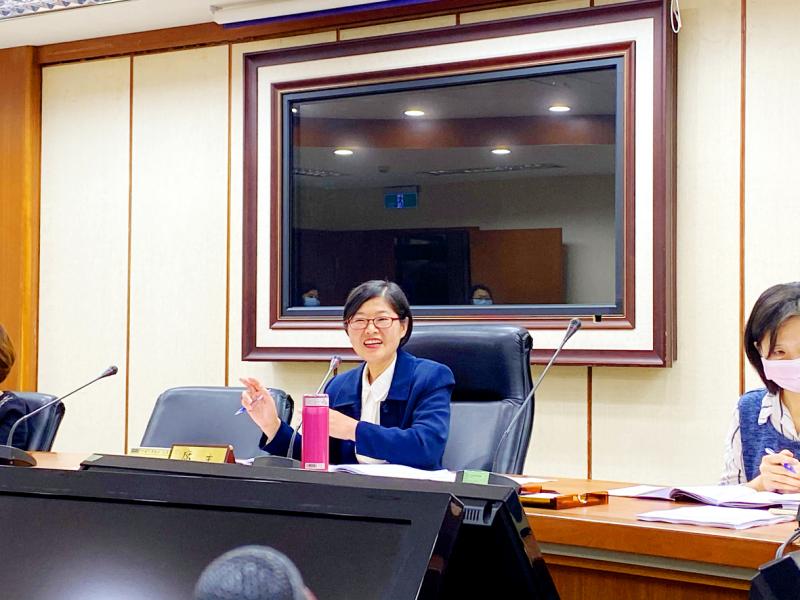Export orders declined 0.8 percent year-on-year last month to US$28.68 billion as the COVID-19 pandemic disrupted production, supply chains and logistics in China, the Ministry of Economic Affairs said yesterday.
On a monthly basis, export orders contracted 18.8 percent from US$35.31 billion, ministry statistics showed.
The ministry said it expects the decline to accelerate this month.

Photo: Huang Pei-chun, Taipei Times
Orders for information and communications technology (ICT) products, one of Taiwan’s most important export categories, was most affected as orders fell 23.4 percent year-on-year to US$6.05 billion.
“More than 90 percent of ICT products, comprised of smartphones, laptops and servers, are manufactured in China, which makes them particularly vulnerable when the country deployed stringent anti-epidemic measures,” Department of Statistics Director Huang Yu-ling (黃于玲) said.
ICT product makers reacted swiftly by moving production back to Taiwan, Huang said.
“This holds true for all product categories, as manufacturers increasingly shift production back home to mitigate the effects of the coronavirus,” Huang said, adding that overall overseas production fell to 40.7 percent last month, hitting a 15-year low.
Meanwhile, export orders for electronics bounced back after a small contraction in January to surge 20.4 percent year-on-year to US$8.82 billion, due to growing demand for semiconductors.
“Upcoming 5G deployment boosted orders for foundry services, design and packaging of integrated circuits as well as memory products,” Huang said.
However, export orders for optoelectronics continued a downward spiral despite an increase in demand for optical lenses, as flat-panel prices struggle to recover.
With part of their production in China hindered, optoelectronics makers posted a 14.7 percent year-on-year decline to US$1.34 billion in orders last month, the data showed.
Orders for traditional manufactured goods, with the exception of petrochemicals, increased by between 1.4 percent and 14.3 percent on an annual basis last month due to a low comparison base.
“While this may seem to provide some respite for traditional manufacturers after incessant declines last year, this situation is unlikely to persist ... especially not for petrochemicals, rubber and plastic products,” Huang said, referring to the recent slump in oil prices.
As COVID-19 spreads worldwide, hitting Europe and the US, export orders are expected to continue to decline this month by between 3.2 percent and 9.3 percent on an annual basis to US$33.5 billion to US$35 billion.
“The virus outbreak in China mainly upset the supply end ... but now we might be facing disruptions on end markets,” Huang said, forecasting a more than US$2 billion decline in orders for ICT makers, which are expected to be the most affected.

South Korea’s equity benchmark yesterday crossed a new milestone just a month after surpassing the once-unthinkable 5,000 mark as surging global memory demand powers the country’s biggest chipmakers. The KOSPI advanced as much as 2.6 percent to a record 6,123, with Samsung Electronics Co and SK Hynix Inc each gaining more than 2 percent. With the benchmark now up 45 percent this year, South Korea’s stock market capitalization has also moved past France’s, following last month’s overtaking of Germany’s. Long overlooked by foreign funds, despite being undervalued, South Korean stocks have now emerged as clear winners in the global market. The so-called “artificial intelligence

‘SEISMIC SHIFT’: The researcher forecast there would be about 1.1 billion mobile shipments this year, down from 1.26 billion the prior year and erasing years of gains The global smartphone market is expected to contract 12.9 percent this year due to the unprecedented memorychip shortage, marking “a crisis like no other,” researcher International Data Corp (IDC) said. The new forecast, a dramatic revision down from earlier estimates, gives the latest accounting of the ongoing memory crunch that is affecting every corner of the electronics industry. The demand for advanced memory to power artificial intelligence (AI) tasks has drained global supply until well into next year and jeopardizes the business model of many smartphone makers. IDC forecast about 1.1 billion mobile shipments this year, down from 1.26 billion the prior

NEW IDENTITY: Known for its software, India has expanded into hardware, with its semiconductor industry growing from US$38bn in 2023 to US$45bn to US$50bn India on Saturday inaugurated its first semiconductor assembly and test facility, a milestone in the government’s push to reduce dependence on foreign chipmakers and stake a claim in a sector dominated by China. Indian Prime Minister Narendra Modi opened US firm Micron Technology Inc’s semiconductor assembly, test and packaging unit in his home state of Gujarat, hailing the “dawn of a new era” for India’s technology ambitions. “When young Indians look back in the future, they will see this decade as the turning point in our tech future,” Modi told the event, which was broadcast on his YouTube channel. The plant would convert

People stand in a Pokemon store in Tokyo on Thursday. One of the world highest-grossing franchises is celebrated its 30th anniversary yesterday.